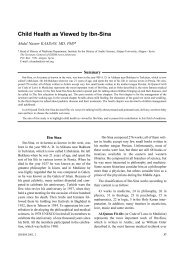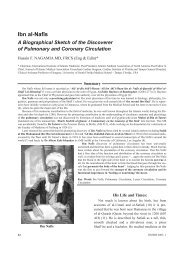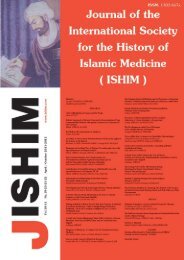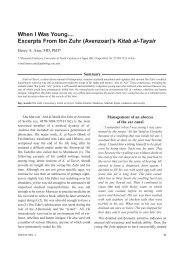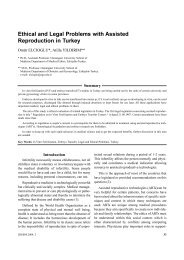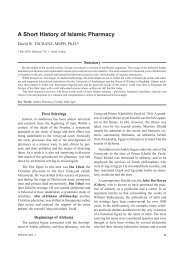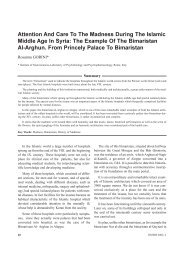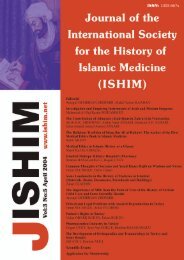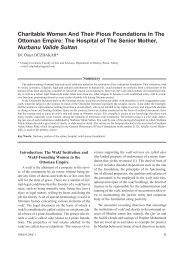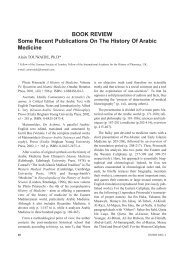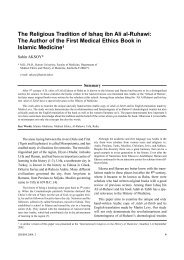Islamic Medicine History and Current Practice - International Society ...
Islamic Medicine History and Current Practice - International Society ...
Islamic Medicine History and Current Practice - International Society ...
- No tags were found...
You also want an ePaper? Increase the reach of your titles
YUMPU automatically turns print PDFs into web optimized ePapers that Google loves.
Nuket ORNEK BUKENvery early stages <strong>and</strong> has a good chance of recoveryfrom the kind of cancer they have developed, theywill be negatively effected by the diagnosis. For thisreason it is important to inform. The life expectancyis much higher for patients who embrace life <strong>and</strong> donot lose their will to survive.Some Inferences aboutTruth-Telling in Our CountryTogether with the characteristics of the physicianpatientrelationship <strong>and</strong> the expectations of the physician<strong>and</strong> patient, is the physician’s duty <strong>and</strong> responsibilities,the process of informed consent <strong>and</strong> ethicalmedical practice <strong>and</strong> whether or not it is consistent withlegal st<strong>and</strong>ards. In this relationship, the goals of thephysician-patient interaction, the physician’s requirements,the role of the patient’s values <strong>and</strong> the conceptof patient autonomy are all extremely important.In solving clinical ethical problems in our countrythe question can be asked of whether or not the guidingethical principles’ priority <strong>and</strong> evaluation is differentfrom those in the West. Can the practices in theWest that gives priority to the developed knowledgeableparticipation <strong>and</strong> the principle of respect for aperson’s autonomy as a part of that be left to the interpretationof one’s culture <strong>and</strong> practices? When welook at these questions from the aspect of basic ethicalprinciples we can say that it is necessary to agreeon the concepts of universal values like respect for anindividual’s autonomy that has developed in the West.We cannot leave to the culture’s own interpretation<strong>and</strong> practices the need to examine basic ethical principles;that is, the evaluation <strong>and</strong> structure of ethicalprinciples in our country related to our subject will notbe any different that in the US, Canada <strong>and</strong> WesternEuropean countries. However there can be a differencein the prioritizing <strong>and</strong> weighting of the principles.For example the principles of “do no harm <strong>and</strong>beneficence” take priority for us over the principles of“respect for autonomy <strong>and</strong> justice” because of thestructure of society, our customs <strong>and</strong> traditions <strong>and</strong>our sociocultural structure. This situation also createsthe substructure for hiding the diagnosis of cancerfrom patients. In that manner in oncology clinics thatwe have often witnessed where everyone knows thepatient’s diagnosis <strong>and</strong> the treatment that will be givenTRUTH-TELLING INFORMATION AND COMMUNICATIONWITH CANCER PATIENTS IN TURKEYexcept the patient not even one patient (even if theyrequest) will be told the truth. The majority of thepatient’s next of kin (as in our case study) take anactive role in the process of hiding the truth. As inother countries that have a clear paternalistic societalstructure, in our country also the physician is generallythe authority figure in the physician-patient relationship.In this way whether it is natural or not therelationship between physician <strong>and</strong> patient, ratherthan collaborative is more one directing the other.Because different examples of this type of relationshipare often met in society in every area of life <strong>and</strong>it is something that has developed based on that, thistype of physician-patient relationship is not regardedas strange <strong>and</strong> the majorities do not see a need tochange the existing system. The majority of patientsin our country during medical treatment are not in theposition to be “knowledgeable <strong>and</strong> effective participantsin the treatment,” they are people in the positionof not knowing who gives them information aboutthemselves or with which physician’s treatment atwhich level they are responsible for or what theirrights are. Conditions like cancer which require a continuouscollaborative relationship between the physician<strong>and</strong> patient do not change this fact. Patients try toget information about the clinical diagnosis <strong>and</strong> treatmentprocess from their nurses or interns or residents.However particularly in chronic illnesses it is a foremostcondition for a “collaborative” type of relationshipwhere the treatment method is chosen taking intoconsideration the patient’s values <strong>and</strong> that the patientis informed about possible risks, the patient requeststhis information, makes the most appropriate choicebased on their own values <strong>and</strong> knows their own rightsin this process, requesting they be honored when necessary.In our country the patient accepts that thephysician is the “authority” with information, experience<strong>and</strong> expertise. The patients do not think theyhave the right to ask questions, but that they have toanswer every kind of question that is asked <strong>and</strong> thatthey are forced to accept every kind of treatment thephysician recommends. Requests for information <strong>and</strong>desire for active participation in their treatment isminimal. Physicians also consider that patients generallyhave a lower sociocultural <strong>and</strong> intellectual level<strong>and</strong> for this reason there is no place for this time-consumingpractice of informed consent, <strong>and</strong> continue thebelief that they will always make the right decision for34 JISHIM 2003, 2



